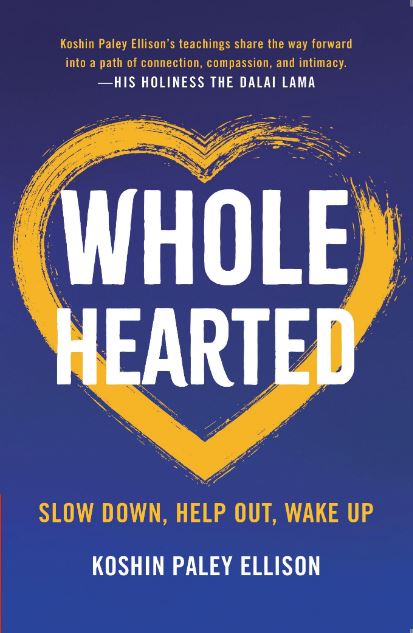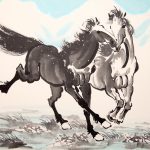Getting In Touch With And Speaking The Truth

The following is the second excerpt from Sensei Koshin Paley Ellison’s Amazon best-selling book, Wholehearted: Slow Down, Help Out, Wake Up. Informed by more than three decades of formal Zen and psychotherapeutic training and practice, Wholehearted brings Sensei Koshin Paley Ellison’s spiritual and clinical expertise into a readily accessible blend of insight and easily actionable guidance. The book provides strategies for identifying and exploring behaviors that often create unconscious barriers to personal confidence and interaction with others. Taking a remarkably fresh approach, Sensei Koshin brings time-honored Buddhist wisdom to how we live our lives, teaching us how to close the gaps we create between ourselves and others, and to wake up to the world around us in doable, wholehearted and positive ways. Find the first excerpt: Inviting Freshness Through Not Knowing here.
To me, lying is intimately connected with vulnerability. I believe when we lie, it’s because we’re afraid of exposing something about ourselves. I have a friend who works with a writer who constantly misses deadlines. It’s actually not that big of a deal, because my friend knows this about the writer, and course-corrects by giving him deadlines that are weeks prior to when my friend actually needs something turned in. The challenges arise not because of the lateness but because the writer can’t seem to accept this shortcoming about himself, so he writes my friend long emails with excuses as to why he’s late again – imaginative stories that my friend knows aren’t true. Because of this, my friend says, she’s established an opinion about this writer that has jumped from the level of “struggles with timeliness” to “pathological liar,” which, as you might imagine, causes ruptures in their working relationship. How much simpler it would be for the writer to email “I’m late again” and leave it at that!
 I’m sure we can all empathize with this writer, though. We all have shortcomings we’d rather not admit to ourselves, habits we’d rather hide. And lying comes from all the interference we create to not actually tell a truth that we perceive will make us vulnerable. But our thinking about this is backward. “I think the greatest illusion we have,” the activist and playwright Eve Ensler writes, “is that denial protects us.” She continues, “It’s a weird thing about truth; it actually protects you. What really makes you vulnerable is when you’re lying, because you know you’re going to get caught, even by your own mind. That you know you’re a liar.” When you do finally tell the truth, there’s a strange relief that comes with it.
I’m sure we can all empathize with this writer, though. We all have shortcomings we’d rather not admit to ourselves, habits we’d rather hide. And lying comes from all the interference we create to not actually tell a truth that we perceive will make us vulnerable. But our thinking about this is backward. “I think the greatest illusion we have,” the activist and playwright Eve Ensler writes, “is that denial protects us.” She continues, “It’s a weird thing about truth; it actually protects you. What really makes you vulnerable is when you’re lying, because you know you’re going to get caught, even by your own mind. That you know you’re a liar.” When you do finally tell the truth, there’s a strange relief that comes with it.
One of my students told me a story once about a man she was assisting in his dying process. His final wish was to see his daughter, from whom he was estranged. My student had to put a lot of effort into finding the daughter, because the man wasn’t in touch with her at all. When she did find her, and told her the father’s dying wish, the daughter said, “I don’t want to see him. I hate him, and I’m glad he’s dying.” My student went back to the man and told him that his daughter wouldn’t come. He pleaded with her to try again. So she went back to the daughter, and this time the daughter acquiesced. “OK,” she said. “I’m not going to stay long, but I’ll come.” My student joyfully brought the news back to the father. She was so happy that she was able to aid with such a beautiful reconciliation. The day the daughter arrived at the hospital, my student was standing outside the door in anticipation. She saw the daughter fly into the room. As soon as she got in, my student heard her say to her father, “You’re one of the most awful people I’ve ever known. You’ve caused more harm to me than anyone I’ve ever met. I hate your guts.” And then she turned on her heel and left. My student went into the room in a panic, apologizing. “I’m so sorry,” she said to the father. “I didn’t know that was going to happen.” The father responded, “That’s exactly what I wanted to happen. The truth is, I was a terrible father. She’s never had the opportunity to tell me that to my face, and I know it was eating her alive.” So that was his last gift to his daughter – the gift of having her truth heard, which was perhaps a relief to them both.
There are the garden-variety lies we tell (I remember when I was teaching poetry, I had a student who had three grandmothers die) but another way to think about lying is our unwillingness to examine what is really true. For me the most challenging lie between people is the lie of omission – what we don’t say. Many years ago I entered into relationship with a teacher whose intelligence, commitment to the path, and no-nonsense outlook inspired me. Over many years, we slowly developed an intimate relationship of trust – which was hard won, as there were many moments of distrust and challenge for both of us along the way. For instance, our relationship seemed to work best when I agreed with whatever my teacher said. I did feel that I was an apprentice, and my role was to learn, so this felt OK at first. I became devoted and did everything I could to support and create a container for my teacher’s vision. I joyfully did anything that was requested or that I could intuit would be helpful. My teacher often called me “son,” which, in the beginning felt like a reward, and I enjoyed this familiarity. I sensed, however, this created a difficult dynamic with my fellow peers; I experienced lots of sibling rivalry for the position of the “number-one son.” After a while, though, feeling prepared with a solid foundation on the path, I began to assert and express my own vision, which in the beginning was, on the surface, well received – but I felt there was something deeply displeasing below the surface. The more I developed my voice, the more the tension increased. This continued for six years. We never spoke about the situation directly; a lie of omission existed in the space between us. Our once flowing, meandering conversations and laughter became short and curt factual conversations, and our eye contact diminished. It seemed the more I became differentiated, the wider and wider the gap became. I don’t think either of us knew how to bridge the gap, and this created distrust.
In Japanese culture there is a word, ma, that describes the space between things. It is what makes Japanese art, architecture, and gardens so unique. So much attention is brought to the gap, to the pause, that you can really see the stone, the scroll, the tree, the shape of a branch. Without attention to the space between, there is no true beauty and life. This is what happened between my teacher and I: the ma was neglected through omission. We had known how to relate to each other earlier, and we did not know how to relate to each other in this new place.
As stories throughout time tell, when the mentor and the student can’t adapt to change and talk about it together, the relationship breaks: Baba Yaga and the adventurers, Chiron and Hercules, Pharaoh and Moses, Darth Vader and Obi Wan, and on and on. This is what happened to us: the lie of omission between us created confusion and distrust, the relationship suffered, and our once deeply held respect for each other was shattered, the bond broken. While profoundly sad for me, it doesn’t discount the love, respect, and appreciation I still feel for my former teacher. My Zen teacher, Sensei Dorothy Dai En Friedman, says, “It takes everything to be free.” We have to be willing to truly be in the layers and discomfort together. With shared commitment, it is possible, and preciously rare. Both people need to be fully willing to get into the muck and learn how to be in it together. When this is possible, my experience is that a deeper intimacy and trust arises.
The Zen Peacemakers understand not-lying as listening and speaking from the heart. It’s a prompt to stay connected to what is authentic for you, to ask yourself – and to be brave in hearing the answer – what you conceal about your own life. We all have those weird little pockets of concealment that we create, don’t we? I’ve never met someone without them, anyway. One person who exemplifies the refusal to lie to himself was the historical Buddha, which is partly what makes his story so inspiring. I’m sure you know people who went into certain careers because their parents wanted them to; “I’m a lawyer because my mom was a lawyer,” and so on and so forth. The Buddha’s dad was like that, too. He wanted his son to be what he (Dad) wanted him to be, instead of what he (Buddha) might want to be. He was a clan leader, kind of like a king. When the Buddha was born, his fortune was told. The oracles said that he would be either a great king, like his father, or a great spiritual leader. Well, his dad sure knew which one of those options he preferred.
He took great pains to make sure that his son was always distracted by some luxury or another and didn’t let him leave the walls of the palace, so he couldn’t follow a spiritual path. Eventually the Buddha did leave the palace, and what he saw, which was essentially suffering, frailty, sickness, and death, struck him to the core. It was the Buddha’s “oh, shit” moment. He could have gone back to the palace and lived out the rest of his days in pleasure, but he couldn’t ignore the truth of what was in front of him. So, he walked away. In our lives, there are often expectations put upon us by another, whether it be our parents, society, what we read in magazines, or whatever. These expectations are almost like an overlay: what our life is “supposed” to be. They have less to do with us (or reality) than with some vague external idea. And then we go about measuring ourselves against that idea. That’s why what happened with the Buddha is so interesting; he encountered something within himself that felt at odds with his overlay – and used that incongruency to pivot.
To learn how to be who we are, it’s essential to actually listen to what’s true, instead of what we’ve been told is true. From this space, we can practice speaking what is actually true from our lived experience. This is the practice of not-lying.
- What do you conceal about your life?
- How can you see and act in accordance with what is?
- How can you be more loving and brave in your relationships?
About Koshin Paley Ellison:
Sensei Koshin Paley Ellison, MFA, LMSW, DMIN, is a best-selling author/editor and nationally recognized spiritual teacher and psychotherapist. In his second book, Wholehearted: Slow Down, Help Out, Wake Up, Sensei Koshin Paley Ellison addresses common distractions, beliefs and habitual patterns, providing a way through stress, disengagement, anger and feeling unloved. Widely acclaimed for his guidance in helping people understand and apply time-tested Buddhist teachings as simple strategies for living in today’s chaotic world, Paley Ellison is a dynamic, original and visionary leader, teacher and speaker. He is a co-founder (with his husband, Sensei Robert Chodo Campbell) of the New York Zen Center for Contemplative Care, the first Zen-based organization to offer fully accredited ACPE (Association for Clinical Pastoral Education) clinical chaplaincy training in America. Through the Zen Center they have educated more than 800 physicians and their students have cared for over 100,000 people facing the vulnerabilities of aging, illness and dying. Follow him on social media:
- Instagram: @koshinpaleyellison
- Twitter: @koshinpaley
- Facebook: @koshinpaley














